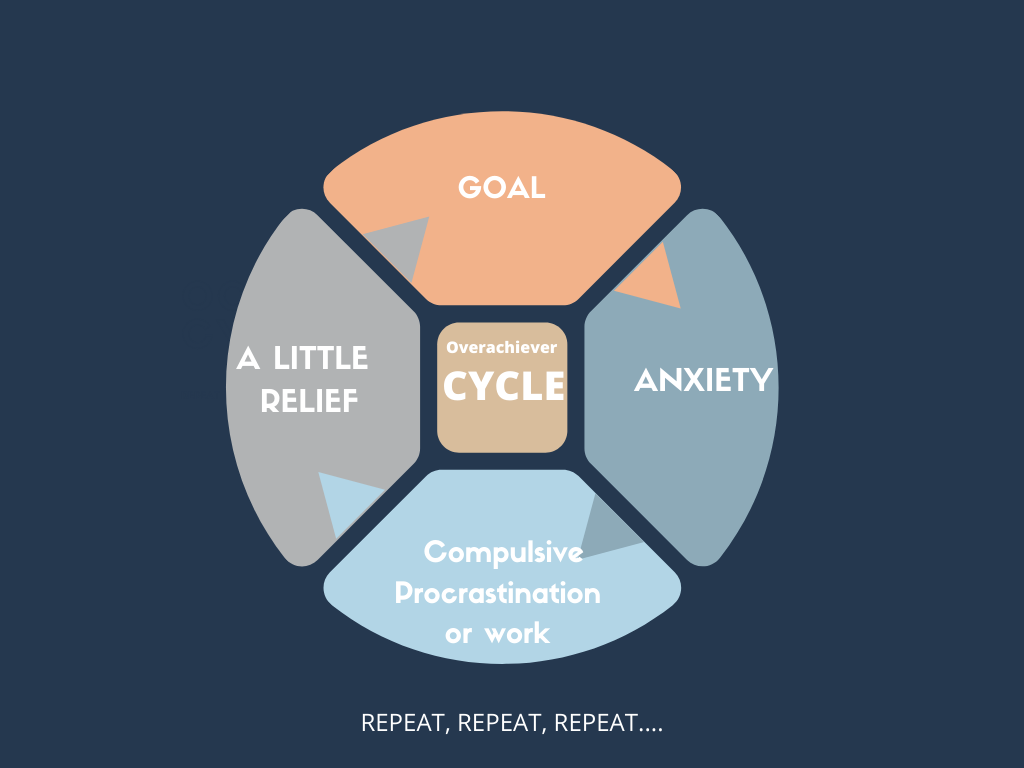My Story of Perfectionism and Burnout
Overachieving is comprised of emotional urges, habits, and so much lost time. I was constantly consumed by the urge to achieve, while outwardly it...
5 min read
KD HOLMES, LPC, EMDR CERTIFIED, BTTI TRAINED
:
Jan 10, 2021 10:38:55 AM

This specific type of anxiety and depression can be particularly challenging to address because it feels intertwined with what many overachievers perceive as their identity. Overachieving behaviors are difficult to relinquish when they bring external accolades, internal positivity, and an overwhelming sense of security-the belief that our relentless efforts are staving off catastrophes. But as comforting as these habits might seem on the surface, they often come with significant costs.
I often liken this form of compulsive overachieving to addiction. Yes, addiction. It's comparable to an alcoholic unwilling to give up their nightly drink because it provides a temporary sense of relief or normalcy. For overachievers, achievement itself is both the high and the safety net. We cannot imagine abandoning this way of living because, in our minds, it’s not just a habit-it’s survival. And I say "living" intentionally because this behavior infiltrates every area of life-personal, professional, and relational. I know this intimately, not just as a clinician, but as someone who has walked this path. I am an overachiever, currently navigating what I call "achievement management." This blog marks just the beginning of a series dedicated to unpacking this complex experience.
The first step in understanding overachievement as both an adaptive and maladaptive strategy is to analyze its benefits and drawbacks in depth. Overachievement can drive individuals to excel, meet ambitious goals, and surpass expectations, often leading to great success and personal satisfaction. However, it can also lead to burnout, heightened stress, and difficulty maintaining balance in other areas of life. This exercise is inspired by Dialectical Behavior Therapy (DBT), a therapeutic approach that emphasizes the importance of examining our behaviors and their impact on our well-being. By thinking critically about these patterns, we can foster meaningful and sustainable change in how we approach achievement and success.
Overachieving often starts as a response to discomfort-depression, anxiety, or sometimes both. Setting and chasing goals creates a temporary sense of control and relief. Even though these habits may exacerbate symptoms long-term, they often feel like a lifeline in the moment. After all, achieving something-anything-brings a fleeting calm and euphoria. Intense emotions in overachievers are often linked to developmental trauma, which means that the drive to achieve can stem from a hypervigilant state developed after experiencing a trauma history. In these cases, overachieving becomes a coping mechanism-an attempt to gain control, validation, or worth in response to feelings of vulnerability or inadequacy. Identifying the underlying trauma can profoundly impact not only the constant urge to achieve but also the emptiness that often lingers beneath it. Trauma can carry with it deep emotional wounds, including feelings of aloneness, pain, humiliation, emptiness, and even terror.
Our culture venerates productivity and success, often equating a person’s worth with their output. Overachievers are frequently celebrated for their drive, receiving validation from family, peers, and colleagues, which further reinforces the cycle.
There’s a dopamine rush tied to reaching a goal. Accumulating achievements offers a sense of purpose and satisfaction that’s hard to ignore. It can feel like tangible proof that you’re doing something "right" in an unpredictable world.
Overachieving provides structure. With constant goals to aim for, there’s seldom a moment spent in stagnation. Instead, there’s always something to do, something to achieve, and the belief that stopping or reducing this effort could result in "failure" becomes a powerful motivator.
For many, the drive to achieve is deeply embedded within their identity and personal values. It’s not just what they do-it’s who they are. Changing this behavior can feel like undoing a fundamental part of the self.
While the benefits may swoop in and create positive feelings in the short term, the long-term consequences of overachieving often paint a different picture.
Overachievers live in constant overdrive, rarely permitting themselves to slow down. The human body and mind need rest to recharge, but this key component of health is often dismissed. The result? Burnout, fatigue, and a vicious cycle of feeling like you cannot stop, even when your body is screaming for you to.
Overachieving tends to devour time. Hours are spent pursuing goals, obsessively planning, or anxiously worrying about the next steps, leaving little room for joy, spontaneity, or meaningful life experiences.
Human connection often takes a backseat to achievements. Relationships are only prioritized when they align with goal-driven behaviors-partners, friends, and family may be recruited into compulsions like reassurance-seeking or rechecking progress. Long-term, this dynamic can strain relationships and make it difficult to build authentic connections.
Some overachievers project their lofty expectations onto friends and family, struggling to accept differing values or levels of ambition. This can create unnecessary conflict and, in extreme cases, result in a perfectionistic parenting style that leaves children feeling they can never measure up.
Ironically, the very behaviors meant to suppress anxiety and sadness can often deepen them. Overachievers report a wide range of symptoms, including chronic worry, sleeplessness, irritability, low self-esteem, and difficulty enjoying life. They also experience heightened social anxiety tied to perfectionistic standards for interactions and an inability to relax, have fun, or engage in deep relationships.
Overachieving isn’t just about pursuing goals; it’s often tied to avoiding failure. The fear of what might happen if they stop achieving becomes the invisible thread holding everything together, but it’s a thread that leads only toward exhaustion, dissatisfaction, and increased psychological distress.

After outlining your list of pros and cons, take a moment of reflection. Ask yourself-do the cons outweigh the pros? If they do, that recognition is powerful because it means change is not only necessary but also possible.
If the pros seem to outweigh the cons, it might be worth taking a deeper look with a therapist. Emotional balancing techniques, like overachieving, can often cloud our judgment and make it difficult to see the bigger picture. We may unknowingly minimize the consequences of our actions while exaggerating the positives to make things seem more favorable than they are. This kind of internal bias can prevent us from addressing deeper issues or making balanced decisions. Often, it’s hard to step back and objectively evaluate these patterns on our own because our perspective is inherently limited. That’s where a trusted, trained professional can make a difference-helping us uncover the truth behind our actions and guiding us through the lies we sometimes tell ourselves. With another person to reflect what they see, we can begin to work through these challenges and find a healthier balance.
Change, especially when tackling such deeply ingrained habits that are rooted in your value system, is rarely a solo endeavor. Overachievers thrive in high-stakes environments but can grow detached from their own needs and emotions. Therapists can help you get in touch with those hidden feelings.
You may feel like giving up your overachieving tendencies will leave a void in your life. I understand this fear deeply. But what if that void could be filled? With rest, connection, joy, and a sense of wholeness that goes beyond temporary accolades and external validation? The path to change starts with addressing that question and exploring the void. Voids can be indicators of a trauma history. It’s important to recognize that healing these wounds through therapy, self-reflection, or support can lead to a more balanced and fulfilling life, one where achievement is no longer tied to unresolved pain.
Remember, achieving isn’t inherently bad. It’s the overuse, the compulsivity, and the fear-driven cycle that make it unsustainable. By examining your habits thoughtfully and seeking support when needed, you can build a life that celebrates balance-a life where achieving is not about avoiding failure but about fostering meaning, growth, and genuine well-being.
I know that sounds idealistic, but imagine the difference it could make if your compulsivity was reduced by even just two percent. Think about the boost to your overall well-being, the sense of freedom and control you'd gain. Picture how empowering it would feel to stop when you want to, rather than feeling like your actions are out of your hands. You’d be able to make choices with clarity, focus on what truly matters to you, and experience life with a greater sense of balance.
Take a moment to consider, with curiosity and compassion, what pros and cons overachievement holds for you. It may just be the first step to creating a life that thrives on balance over burnout.

Overachieving is comprised of emotional urges, habits, and so much lost time. I was constantly consumed by the urge to achieve, while outwardly it...

During my first session with a client (also known as “the intake session”) I always ask no matter what the mental health issue—

One of the fundamental pillars of my therapeutic approach focuses on adults who find themselves entangled in the intricate web of anxiety and...